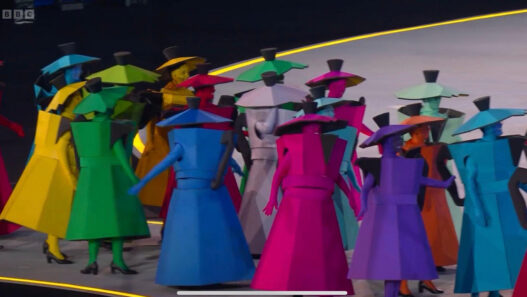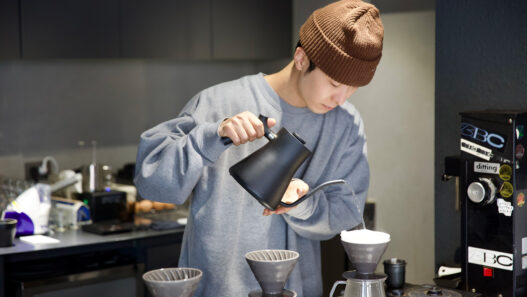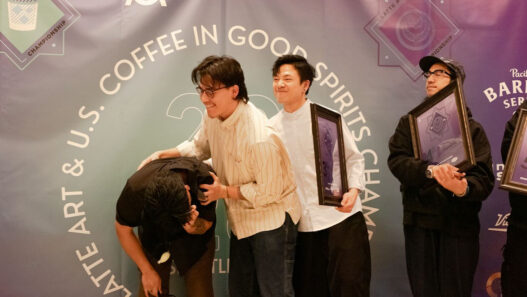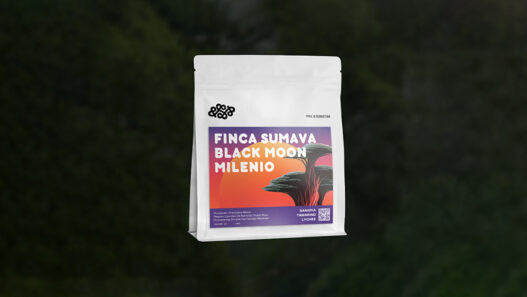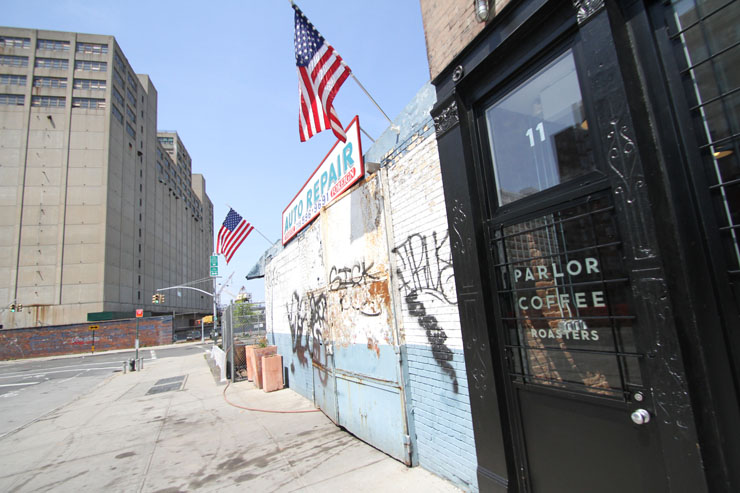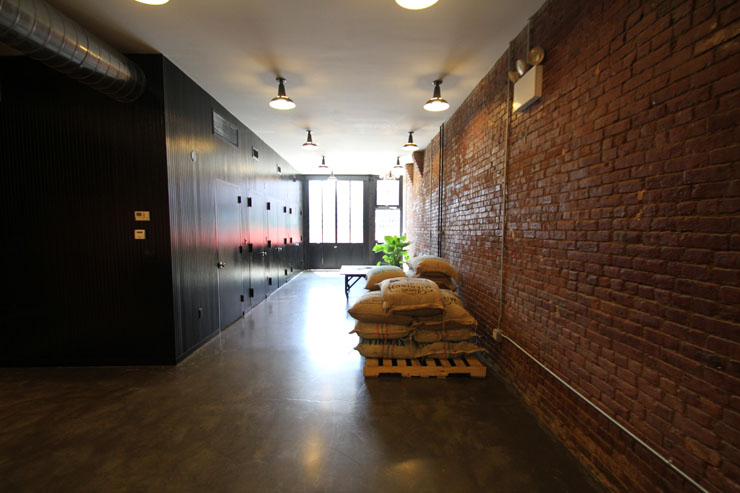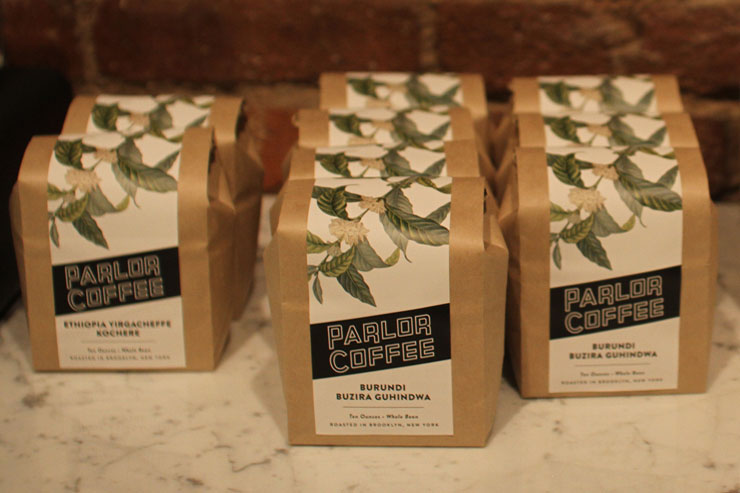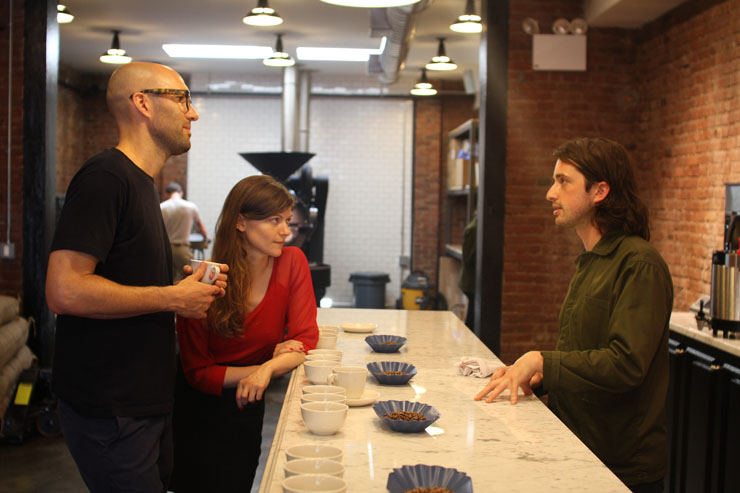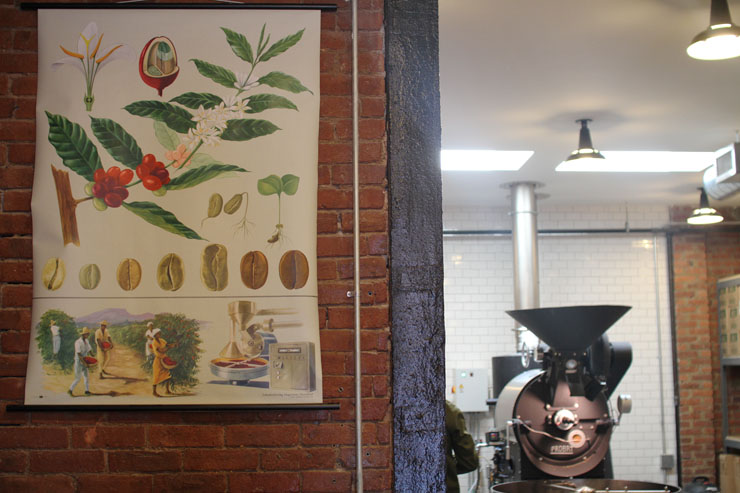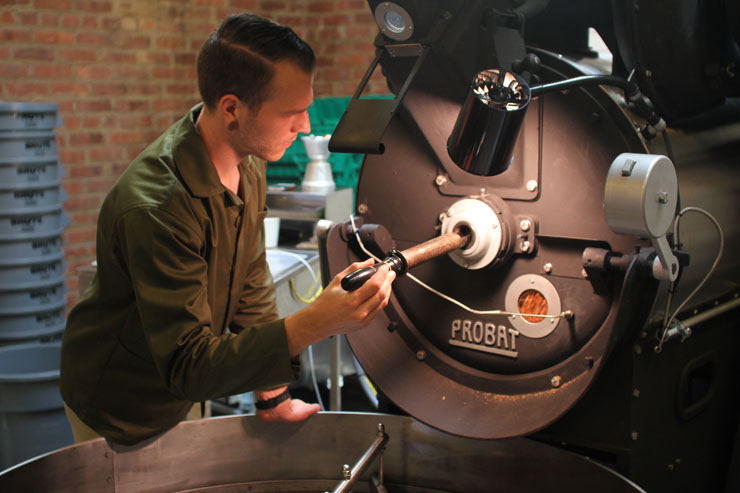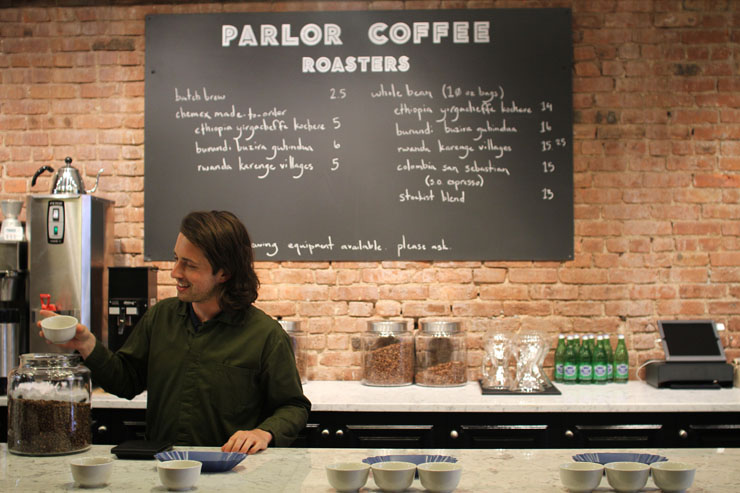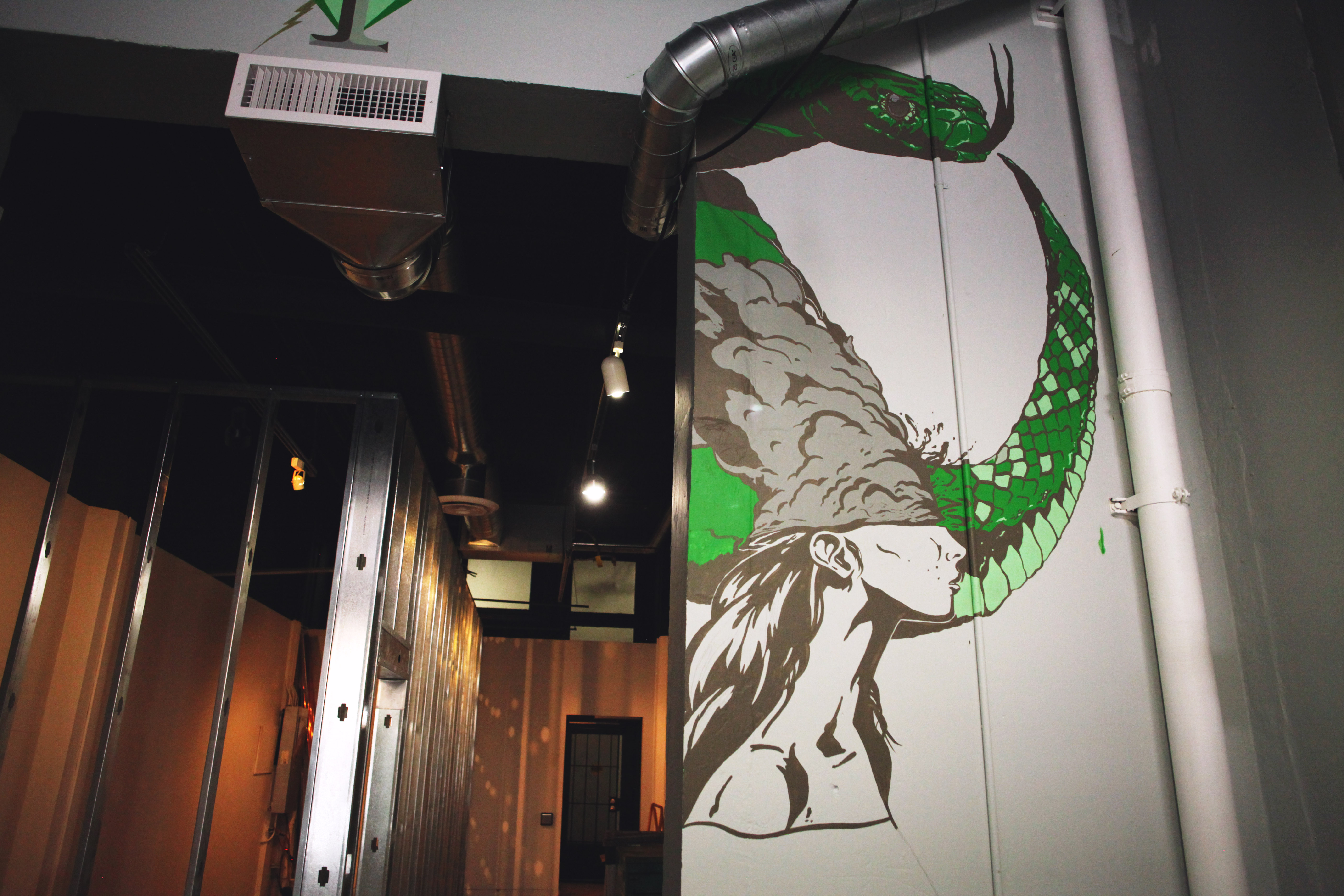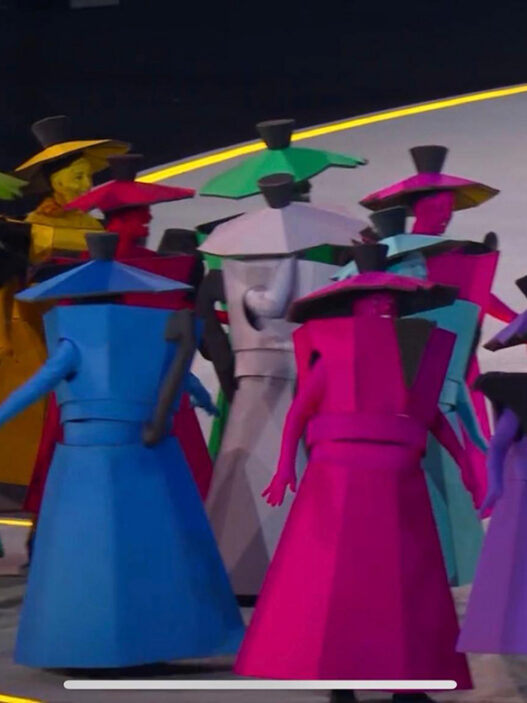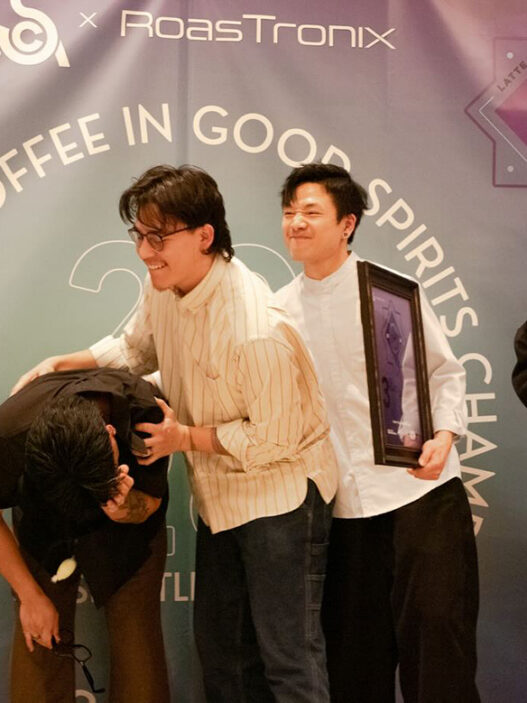In coffee, the little pop-up that could is the ultimate princess story. From humble beginnings and organic growth are born some of coffee’s most beloved names, and Brooklyn-based Parlor Coffee is living that dream today, in an unlikely corner of Brooklyn, beneath the nouveau-industrial shadow of the Brooklyn Navy Yard.
Parlor’s founder, Dillon Edwards, grew the company from a Kees van der Westen Speedster in the back of stylish northside Williamsburg, Brooklyn barbershop called Persons of Interest. The tiny room in the back of the salon drew notice, not just for its hip cachet but for the widespread word of the quality of coffee being served there–and what’s more, the gossips would whisper, they roasted their own. Edwards, a South-by-Northwest-to-New-York transplant, is an alum of both Stumptown and Blue Bottle, and has together with former Blue Bottle roaster David Stallings grown Parlor from a haircut pop-up to a boutique roasting space, all while foregoing the formalities of opening a full-fledged cafe.
“I’ve been a barista for 8 years, made a lot of lattes and iced coffees, and I didn’t want to do that right now,” said Edwards last Sunday from across the long bar at Parlor’s brand new roastery and tasting room at the top of Vanderbilt Avenue. Parlor’s new digs are well turned-out. The long corridor of space is lined with tidy closets, a vintage four-seat wooden stadium bench, and sacks of green coffee feng-shui’d in just such an arrangement as to be stylishly casual, yet totally on purpose.
The center of the space contains the tasting bar, which for now is only open to the public on Sundays from 10am-4pm, with free public cuppings at 3pm. During the remainder of the hours, coffee fans and Navy Yard tourists can sample the full line of Parlor’s seasonal coffees–roasted far to the lighter side of most of New York City’s palates, we reckon–on Chemex or Fetco. There is no espresso service, because this is a tasting room, you animal.
In the back, you’re likely to see roaster and green buyer Stallings manning the 1965 Probat UG-22 to which the company graduated after completing a tenure at Pulley Collective, a time-shared roasting space in Red Hook. Beans and gear are for sale, though the real draw here is the intimacy and opening up of a conversation about coffee with Edwards: Nashville-friendly, egaliterian and professional all at once. He’ll guide any who care through a description of his three current single origins–currently an Ethiopia Kochere from Yirgacheffe, a Burundi Buzira Guhindwa, and a Rwandan coffee from the Karange villages.
A whole roastery might seem like overkill for a tasting room and a tiny espresso bar in the back of a barbershop, but that’s missing the bigger ambitions of this project. Parlor have quickly become wholesale players across North America, with accounts stretching from Bed-Stuy’s newest petit-cafe, Anchor Coffee, all the way to the esteemed Revolver in Vancouver, as well as Boulangerie Hof Kelsten and Dispatch Coffee, a mobile cafe truck, in Montreal.
We leaned across the tasting room bar for a deeper chat with Edwards to find out more about the Parlor trajectory and ethos.
Tell us about your experience with Brooklyn’s Pulley Collective. It seems as if you’re one of the first to make the most of the “roasting incubator” model–how did it work for you?
Pulley was great for us at Parlor, both in terms of timing and in helping to foster our involvement in the local coffee roasting movement. We roasted there for a full year.
What’s your vision for the roasting space and tasting room? You’re currently only open to the public for six hours on Sundays, do you hope to stay that way?
Our hope is that the tasting room will be a place that is 100% accessible yet offers an experience that elevates how people think about coffee. We’re keeping it simple: currently brewing all offerings on Chemex, serving batch-brewed Fetco, and offering a free cupping at 3pm. It’s not really about the equipment here as much as the coffee itself. It’s an intimate space where anyone can drop by and see our production up-close while tasting our offerings. Our goal is to present these coffees as beautiful and unique, but in a simple format. Right now we’re only open on Sundays to the public. That may change eventually, we will see.
What, besides whole bean coffee, will people be able to pick up (equipment or otherwise?) if they drop by the tasting room?
Folks will be able to pick up anything they’d need to brew filter coffee at home. We will be selling Chemexes, filters, kettles, grinders, and scales. That’s my preferred way to brew coffee. But, we will also have Bonavita brewers available and, who knows, we may diversify it eventually. I don’t really want to make it overly complex. I think for a long time, the industry has tried to highlight the diversity of brew methods available. And there’s certainly something exciting and worth celebrating about how many brew methods there are out there. But, I feel that that diversity can be a bit overwhelming for someone who may not even really know what basic flavors to expect from a Yirgacheffe or, say, a Kenya Nyeri coffee. I want to make the coffee itself more accessible for our audience to appreciate.
At first glance, the roastery/tasting space is highly evocative of Stumptown, and of Stumptown’s former Red Hook tasting room specifically, in terms of concept, hours, etc–you even have the same poster and chalkboard menu style. What will you say to those who draw the comparison?
I welcome that comparison. I worked for Stumptown out in Portland and here in New York at the Ace. It’s where I got my start and I took a lot of inspiration from working with Stumptown. I was no longer with the company when they opened their brew bar in Red Hook–but, I visited it and I liked the concept. I will say that our concept is different, especially in regard to the simplicity of our presentation. Stumptown’s brew bar highlighted an extensive list of brew methods and an extensive list of coffees. We want to present just a handful of coffees, four or five at a time with only Chemex as the brew method on hand. I want people to walk away feeling like coffee can be delicious, unique and complex but totally accessible.
You started as a pop-up with, presumably, just you helming the espresso machine at Persons of Interest while also roasting after hours. How many staff have you expanded to now?
Parlor has grown to be a little company of 6 of us (including me). It was a pretty big turning point for us when we brought David Stallings on to the team about a year ago. He’s now in charge of our green buying. We’re a small group, but it’s a solid team.
How is wholesale growing for Parlor coffee? I know you have accounts as far flung as Montreal and Vancouver. How did those come about (there’s not a lot of micro-roasted NYC coffee in Canada!) and who else have you enjoyed working with closer to home?
Our wholesale business has grown fairly organically: through friendships and referrals mostly. Even some of our relationships have begun with an espresso at our pop-up at Persons of Interest barbershop. Canada is this awesome surprise. I’m so glad to see our coffee being served at Revolver in Vancouver. That’s a top-notch shop working with some of the best roasters in North America. As for Brooklyn and New York City, we’re proud to have many friends here. I always like stopping by Propeller in Greenpoint and it’s been rad to have our single-origin espresso served at the Wythe Hotel.
Thanks, Dillon!
Liz Clayton is the Associate Editor at Sprudge.com, based in Brooklyn. Read more Liz Clayton on Sprudge.




